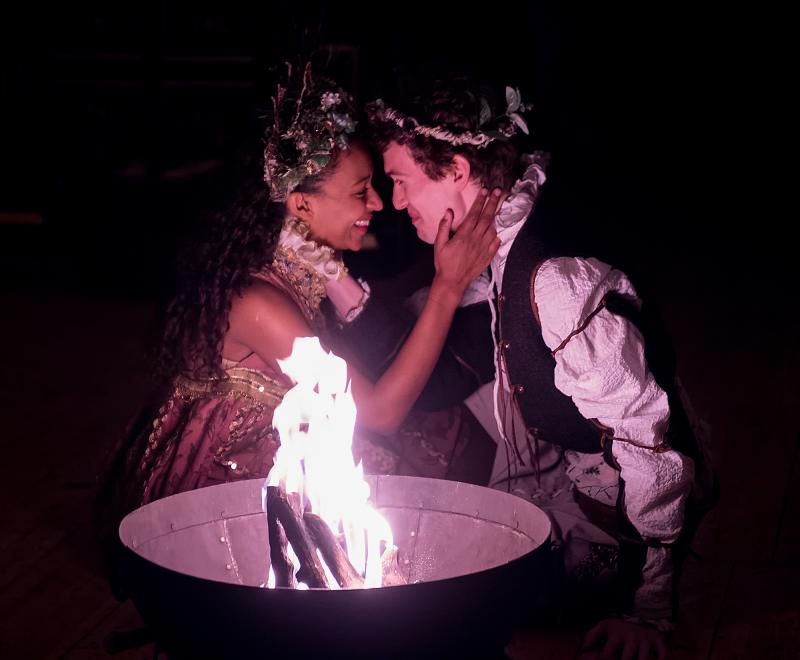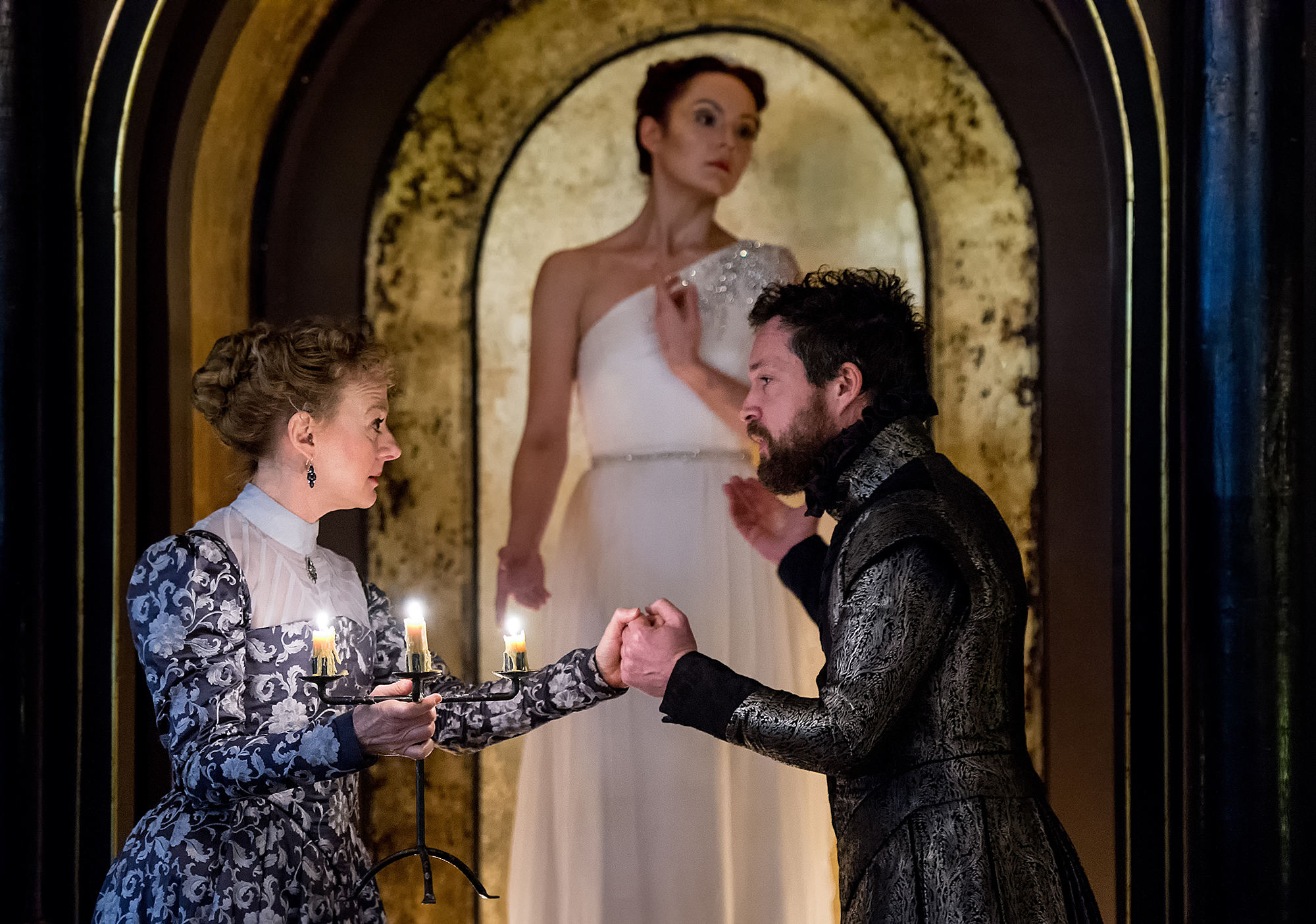The Winter's Tale, Sam Wanamaker Playhouse | reviews, news & interviews
The Winter's Tale, Sam Wanamaker Playhouse
The Winter's Tale, Sam Wanamaker Playhouse
Shakespeare's tale is told quietly here but with tremendous charm and impact

For a play about silence – its uncanny ability to tell the truth, to “persuade when speaking fails” – The Winter’s Tale is remarkably wordy. Of the sequence of late romances only Cymbeline comes close to the dense and elliptical verbal patterning we find ourselves tangled in here.
After a riotous Pericles and troubled Cymbeline, this third play in Dominic Dromgoole’s farewell quartet of late Shakespeare sees dramatic energy build, setting us up for the finale of Dromgoole’s own Tempest later this month. It helps that by now we’re getting a sense of the actors as a company – the same figures returning in each show as echoes, opposites and variations of their former characters. It’s a delight to see Jessica Baglow’s poised Marina give way here to a lusty, grubby Mopsa, and it’s quite the sea-change that transforms James Garnon’s Pericles into his incorrigibly villainous, relentlessly charming Autolycus.
Cusack is the charge that ignites a deliberately static first half
But before we’re allowed to escape to Bohemia’s songs and sex, Longhurst gives us a Sicilia of rare violence. The imprisonment of Rachael Stirling’s Hermione and her subsequent courtroom judgement are no mere formalities. Chained and bloodied, streaked with dirt, she struggles to stand, yet still delivers her defence with all the authority of a crowned and gowned monarch. Her warmth, even in anger, reflects off the hard surfaces and sharp corners of John Light’s Leontes, softening the brutality of this unsympathetic figure even as his destructive jealousy is written on her in wounds. In the context of such an opening, Stirling's unquestioning affection at the close (her physical actions chafing against her refusal to address her husband directly) strikes an awkwardly unresolved chord.
 Even Niamh Cusack’s Paulina (pictured right with Light) is waspish, destroying with words what Hermione must later restore in silence. Nervy and energetic, Cusack is the charge that ignites a deliberately static first half, her restless movement finding release and expression in the frankly erotic dances of the sheep-shearing festival. But even these celebrations aren’t without their darkness; in Longhurst’s vision Bohemia and Sicilia share more than they differ, and the power abuses of courtly marriage find sinister echo in the thrusting, violating masculinity of the three peasant rams.
Even Niamh Cusack’s Paulina (pictured right with Light) is waspish, destroying with words what Hermione must later restore in silence. Nervy and energetic, Cusack is the charge that ignites a deliberately static first half, her restless movement finding release and expression in the frankly erotic dances of the sheep-shearing festival. But even these celebrations aren’t without their darkness; in Longhurst’s vision Bohemia and Sicilia share more than they differ, and the power abuses of courtly marriage find sinister echo in the thrusting, violating masculinity of the three peasant rams.
Which isn’t to say this is a Tale without charm. Miscast as Pericles, Garnon is back at his best as Autolycus, the roguish pedlar. Singing and strumming with throwaway skill, Garnon’s is a one-man-band of a performance, whether laying out his range of accents for our delectation, seducing or stealing sips of beer from the audience, or distracting them with laughter while, unnoticed, picking pathos from their emotional pocket. It’s bravura stuff, but it speaks to the strength of the ensemble cast around him that it never once threatens to overbalance the play.
 Fergal McElherron’s Camillo, David Yelland’s gloriously-spoken Antigonus (pursued by an exceptionally fine bear) and Sam Cox’s wry Old Shepherd each make their mark, their wry wisdom framing the innocence of Tia Bannon and Steffan Donnelly’s central romance. If Donnelly’s Florizel seems to have come by way of Eton, it doesn’t spoil his impetuous directness, which sparks nicely off Bannon’s rather more matter-of-fact Perdita.
Fergal McElherron’s Camillo, David Yelland’s gloriously-spoken Antigonus (pursued by an exceptionally fine bear) and Sam Cox’s wry Old Shepherd each make their mark, their wry wisdom framing the innocence of Tia Bannon and Steffan Donnelly’s central romance. If Donnelly’s Florizel seems to have come by way of Eton, it doesn’t spoil his impetuous directness, which sparks nicely off Bannon’s rather more matter-of-fact Perdita.
Richard Kent’s designs do a lot with very little, letting the Wanamaker’s space and its unique rhetoric of light do most of the talking, often amplified by Simon Slater’s attractive score. Longhurst and his collaborators here share a lightness of touch, a generosity that is content to display the text to its best advantage, clear and clean. Pericles may need all the help it can get, but, given the right environment, The Winter’s Tale tells itself – all the more captivating for its simplicity, all the more persuasive for a director’s refusal to speak too loudly.
rating
Explore topics
Share this article
Add comment
The future of Arts Journalism
You can stop theartsdesk.com closing!
We urgently need financing to survive. Our fundraising drive has thus far raised £33,000 but we need to reach £100,000 or we will be forced to close. Please contribute here: https://gofund.me/c3f6033d
And if you can forward this information to anyone who might assist, we’d be grateful.

Subscribe to theartsdesk.com
Thank you for continuing to read our work on theartsdesk.com. For unlimited access to every article in its entirety, including our archive of more than 15,000 pieces, we're asking for £5 per month or £40 per year. We feel it's a very good deal, and hope you do too.
To take a subscription now simply click here.
And if you're looking for that extra gift for a friend or family member, why not treat them to a theartsdesk.com gift subscription?
more Theatre
 Shanghai Dolls, Kiln Theatre review - fascinating slice of history inadequately told
Amy Ng's take on two Chinese titans needs more dramatic ballast
Shanghai Dolls, Kiln Theatre review - fascinating slice of history inadequately told
Amy Ng's take on two Chinese titans needs more dramatic ballast
 Manhunt, Royal Court review - terrifyingly toxic masculinity
After his Olivier Award win for Oedipus, Robert Icke turns to a modern “monster”
Manhunt, Royal Court review - terrifyingly toxic masculinity
After his Olivier Award win for Oedipus, Robert Icke turns to a modern “monster”
 Midnight Cowboy, Southwark Playhouse - new musical cannot escape the movie's long shadow
Two misfits misfire in misconceived show
Midnight Cowboy, Southwark Playhouse - new musical cannot escape the movie's long shadow
Two misfits misfire in misconceived show
 Thanks for Having Me, Riverside Studios review - snappily performed comedy with a lightweight core
Writer-actor Keelan Kember floods the stage with a torrent of gags but few ideas
Thanks for Having Me, Riverside Studios review - snappily performed comedy with a lightweight core
Writer-actor Keelan Kember floods the stage with a torrent of gags but few ideas
 Rhinoceros, Almeida Theatre review - joyously absurd and absurdly joyful
Ionesco classic gets an entertainingly vivid and contemporary update
Rhinoceros, Almeida Theatre review - joyously absurd and absurdly joyful
Ionesco classic gets an entertainingly vivid and contemporary update
 The Importance of Being Oscar, Jermyn Street Theatre review - Wilde, still burning bright
Alastair Whatley honours his subject in a quietly powerful performance
The Importance of Being Oscar, Jermyn Street Theatre review - Wilde, still burning bright
Alastair Whatley honours his subject in a quietly powerful performance
 Stiletto, Charing Cross Theatre review - new musical excess
Quirky, operatic show won't please everyone, but will delight many
Stiletto, Charing Cross Theatre review - new musical excess
Quirky, operatic show won't please everyone, but will delight many
 Alfred Hitchcock Presents: The Musical, Theatre Royal Bath review - not a screaming success
1950s America feels a lot like 2020s America in this portmanteau show
Alfred Hitchcock Presents: The Musical, Theatre Royal Bath review - not a screaming success
1950s America feels a lot like 2020s America in this portmanteau show
 Wilko: Love and Death and Rock'n'Roll, Southwark Playhouse review - charismatic reincarnation of a rock legend
Johnson Willis captures the anarchic energy and wit of the late guitarist
Wilko: Love and Death and Rock'n'Roll, Southwark Playhouse review - charismatic reincarnation of a rock legend
Johnson Willis captures the anarchic energy and wit of the late guitarist
 Dear England, National Theatre review - extra time for stirring soccer classic
James Graham adds a neat coda to his ode to decency in sport
Dear England, National Theatre review - extra time for stirring soccer classic
James Graham adds a neat coda to his ode to decency in sport

Comments
I would like to know which
I would like to know which ones of these plays are available in dvd and or blue ray, if possible with english sub titles. I do not understand very well the spoken english, but i like to listen to your voices and read the subtites.
thanks